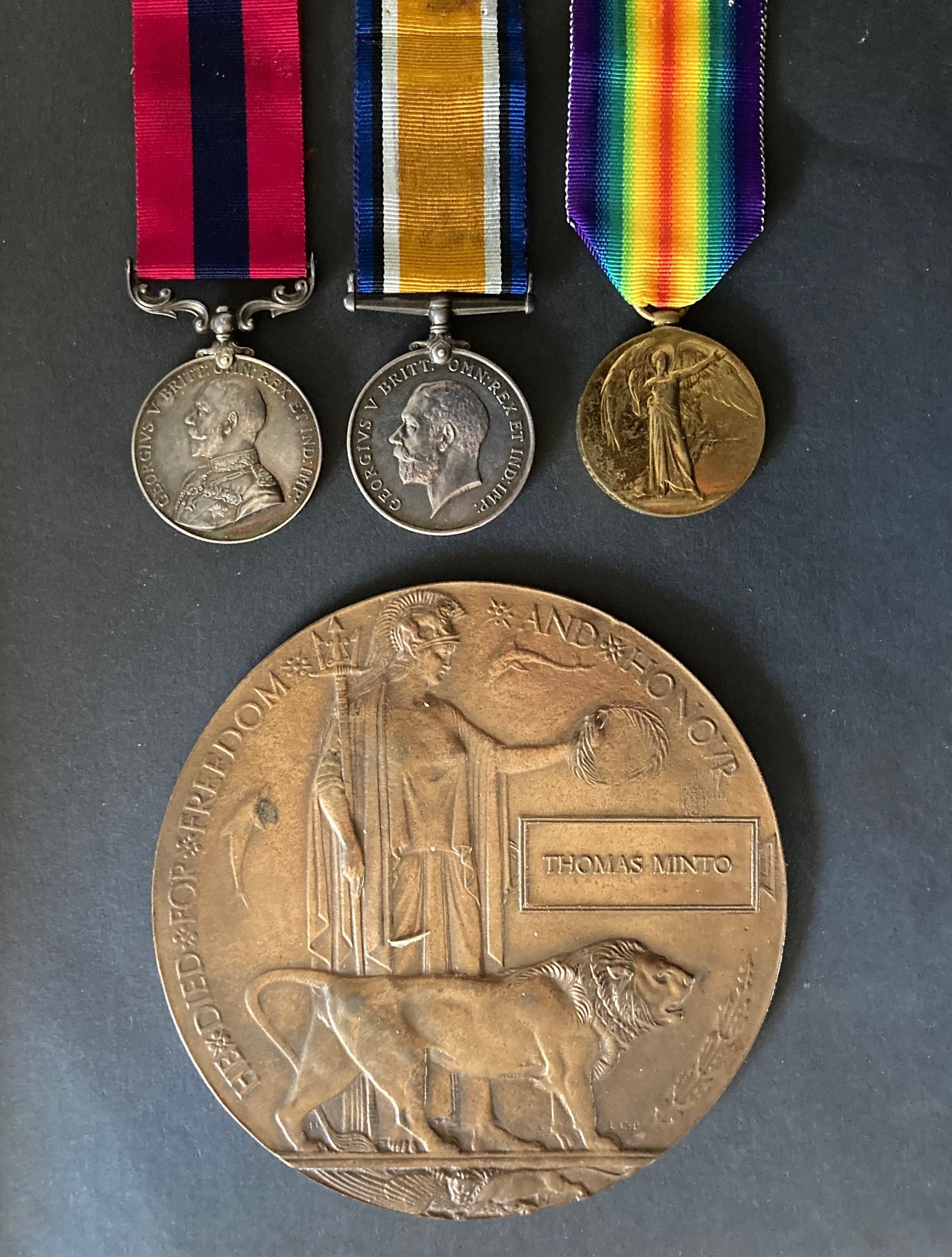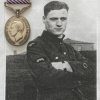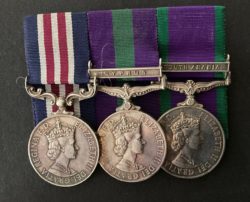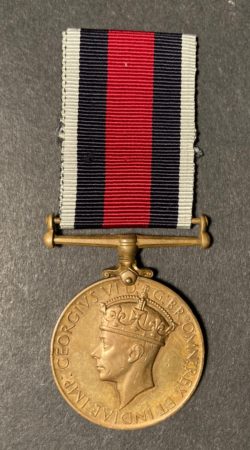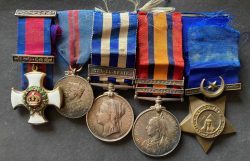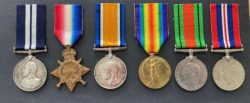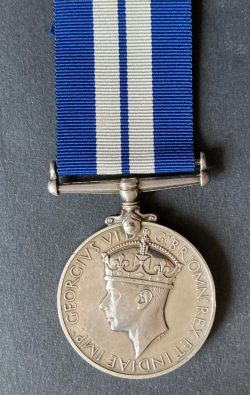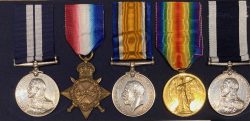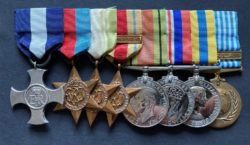A Great War D.C.M. group of three with Memorial Plaque Sergeant, 18th Battalion, (Bantam Btn.) Highland Light Infantry, Wounded January 1918 and died at Rouen June, 1918. ’Shot at Dawn’ direct connection as platoon sergeant of and primary witness against Pte. Hugh Flynn who deserted moving up to the front line and executed after his capture some weeks later , the contradiction in evidence by the recipient being largely causal.
£1,700.00
Out of stock
Distinguished Conduct Medal, G.V.R. (5320 Sjt: T. Minto. 18/High: L.I.); British War and Victory Medals (5320 Sjt. T. Minto. High. L.I.); Memorial Plaque (Thomas Minto) extremely fine (4) £700-£900
D.C.M. London Gazette 22 October 1917; citation published 26 January 1918:
‘For conspicuous gallantry and devotion to duty. During an attack, finding that a Lewis gun was required, he conducted a party through the enemy barrage and brought up a gun and ammunition. The following day, when his company were holding the line and communication was cut, he twice volunteered and brought the required information through heavy hostile barrage.
On the second occasion, although badly stunned and shaken, he refused to become a casualty, and continued at duty, superintending and reorganising the men. His complete disregard of personal danger and quick appreciation of the situation proved invaluable to his company Commander.’
Thomas Minto was born in Glasgow 1891 and attested there for the Highland Light Infantry. He served with the 18th Battalion during the Great War on the Western Front, ( D.C.M.) . He died on 9 June 1918, and is buried in St. Sever Cemetery Extension, Rouen, France. In January 1918, The Highland Light Infantry Chronicle reported (according to Spink details of 2017) that Minto had been wounded; he died on 9 June 1918, aged 27 years. His wife, Margaret, latterly resident at 32 Tobago Street, Calton, Glasgow, latterly of Gallowaygate, Glasgow was left a widow with two young children.
The 18th Bantam Battalion was embarked for France in February 1916, where it fought in the battle of the Somme at Bazentin Ridge and Arrow Head Copse. In September 1917, the Battalion was re-titled the 18th (Glasgow Yeomanry) Battalion, Highland Light Infantry. It was subsequently heavily engaged in the 2nd Battle of Passchendaele.
The King’s Crater incident and the execution of Pte Hugh Flynn
The contradiction in evidence between Minto and the accused as to whether Flynn had requested to report sick was pivotal in the final judgement . The truth of it shall never to known and whether Flynn’s previous brush with Minto had marked him out.
On 26 July, as the Scots soldiers of D Company trudged along Dublin Trench towards the front line one their veterans, Private Hugh Flynn, disappeared. His absence was not even noticed until much later, when the missing man’s platoon sergeant (Minto) realised that there was one surplus allocation of rations.
In mid-September, news of the whereabouts of Private Hugh Flynn reached the 18th Bn. Highland Light Infantry and on 18 September a couple of escorts were sent to bring him back from St. Pol. The following day he was back with his battalion at Roclincourt, where he was charged with desertion and on 27 October he tried by Field General Court Martial at Arras.
The first prosecution witness gave evidence about the time and date on which Flynn had disappeared, and was subsequently cross-examined by Barrie. The lieutenant’s questioning of the first witness, Sergeant Thomas Minto, the defendant’s platoon sergeant, drew court’s attention to Flynn’s mental state at the time he had gone absent. The written proceedings recorded the exchange:
Q: On or about 26th July 1916 did he ask you to take him to see the M.[edical] O.[fficer]?
A: I didn’t remember him doing so.
Q: When you saw him about an hour [sic] previously to his disappearance did it appear to you to be in his proper senses?
A: Yes.
Q: Have you always been his Platoon Sergeant?
A: For at any rate a twelve month.
Q: What has been your impression of Flynn? Is he a level-headed man and always responsible for his actions?
A: Yes, except at Delville Wood when he was very shaky under the bombardment.
(question by the Court)
Q: Where did the Battalion go to on the following day?
A: Up to the sunken road behind Guillemont.
Q: Did you know that the Battalion was going there?
A: Yes.
Q: Did you inform the men to this effect?
A: I did not but the men had got the information and were all talking of it.
Flynn’s defence consisted of a statement:
“I remember going up to a trench which I believe was Dublin Trench when there was very heavy shelling. After that I don’t remember anything until I found myself in Corbie. I thought it the best thing to do to join up with some other regiment and start afresh and meant to do so. I went back along the route the Bn. had taken when marching to the Somme. I was on the road for several days, living on what I got from soldiers. I was never stopped or questioned by any military police. At a place which I afterwards learnt was Auxi le Chateau, following my intention of joining again I spoke to Private Robson and asked if I could join the army and I went with him to see the Adjutant with this intention. I told the Adjutant that I was a stowaway and wanted to join the army. When in the trenches I asked Sergeant Minto to take me to the M.O (i.e. Medical Officer). He walked away when I asked him and I did not see him again. I picked up the soft cap I was wearing at Corbie.”
Then, because he had given evidence under oath, it was permissible to cross-examine Flynn. Again, it is unclear from the written proceedings whether the questions were posed by Barrie or the prosecuting officer. However, from the nature of the interrogation, it seems most likely to have been the latter:
Q: Could you not have gone on sick parade if you wanted to see the M.O.?
A: No, the time had gone by.
Q: Were you unwell?
A: Yes
Q: Did Sergeant Minto take no notice of your request?
A: No.
Q: Why did you not return to your Battalion when you came to Corbie?
A: I thought it best to go some place where I could report myself and join up again.
Q: Why did you not report yourself at Corbie?
A: I never thought of that.
The court decided that Flynn was guilty and sentenced him to death. The prosecuting officer, Lieutenant E.B. Maule, the Acting Adjutant of 18th Battalion, Highland Light Infantry, was invited to disclose to the court details of the convicted soldier’s previous disciplinary offences. Maule revealed that while Flynn had been stationed comparatively near to his home in Glasgow, the soldier had committed eight relatively minor offences since 19 April 1915, the day on which he enlisted. These included: inattention on parade; missing a parade; five minor absences (one of which was the day after Hogmanay) and swearing at two N.C.O.’s, one of whom was Sergeant Minto. His only offence while on active service had been ”Inattention to his duties as a sentry” on 3 June 1916, for which he had been punished three days later with a fortnight’s Field Punishment No.1 by his commanding officer, Lieutenant Colonel Lawrenson.
Brigadier-General O’Donnell agreed Flynn was a congenital coward, commenting:
“I do not recommend that the extreme penalty should be inflicted in this case. Though this man does not appear to be a useful soldier on account of his extreme nervousness, he is not of bad character. I agree with his Commanding Officer in believing that this crime was not committed deliberately in order to avoid a particular duty, but was the outcome of a cowardly disposition.
The recently appointed commander of 35th Division, Major General Herman Landon disagreed and insisted that, “ The case appears to be one without any extenuating circumstances, and to deserve that sentence be put into execution. Landon’s was a view with which Lieutenant General Aylmer Haldane, commanding 6 Corps, concurred.
General Allenby, the 3rd Army Commander, briefly agreed to have Flynn killed but attached no justification for his decision. On 11 November, Haig added his endorsement and four days later, at 6.35 a.m. in the village of Habarcq Flynn was shot by a firing squad supervised by Captain C. Hamilton, Assistant Provost Marshal, 35th Division.
A fascinating group

